Nature Conservation Egypt (NCE) is leading a transformative ecotourism initiative in Aswan, Egypt, turning local hunting tour operators into champions of bird conservation. Through training, community engagement, and scientific monitoring, the project is helping reduce pressure on waterbirds around Lake Nasser while creating sustainable livelihoods for local residents. The ambitious project is funded by Birdlife International and supported by OSME and Ministry of Enviroment.
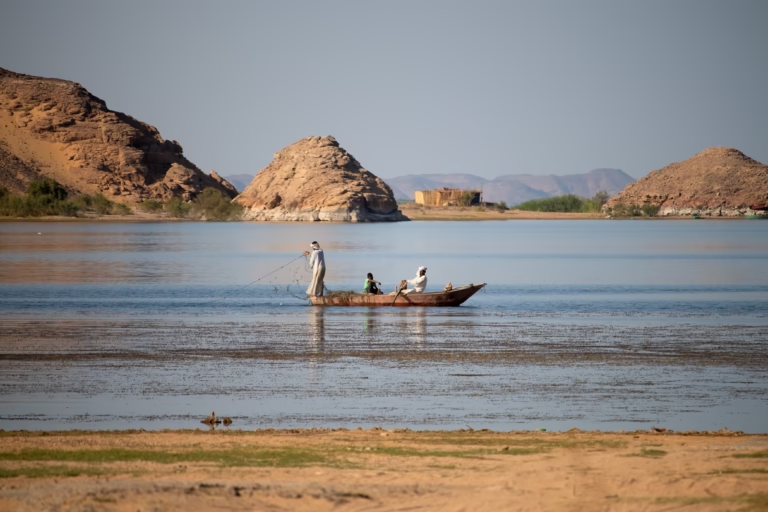
NCE has successfully implemented an ambitious conservation and community‑based initiative in Aswan, Egypt, aiming to transform the livelihoods of local hunting tour operators around Lake Nasser by promoting ecotourism as a sustainable source of income.
The project, titled “Promoting Ecotourism as a Sustainable Alternative Income‑Generating Activity for Local Hunting Tour Operators at Lake Nasser,” supported by Birdlife International has combined on‑ground training, scientific monitoring, and community advocacy to reduce hunting pressure on waterbirds while creating new opportunities for local residents.
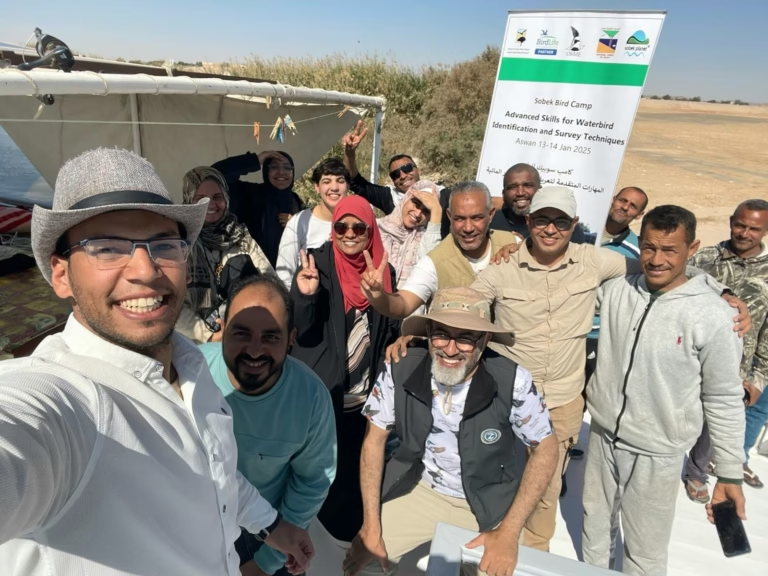
Building skills in Bird Identification
The first phase focused on training.
On 28–29 December 2024, NCE organized an introductory course in Aswan on waterbird identification. The training, which included both classroom sessions and practical field observation, and achieved in Co-operation with OSME and Sobek Planet Eco-tourism company, introduced 14 beginners —seven of them women— to the rich birdlife of the region.
An advanced course followed shortly afterward, providing 13 trainees (including seven women) with intensive lessons on identification and survey techniques. Participants joined experts during the mid‑winter waterbird count, gaining hands‑on experience over five days of fieldwork on Lake Nasser.
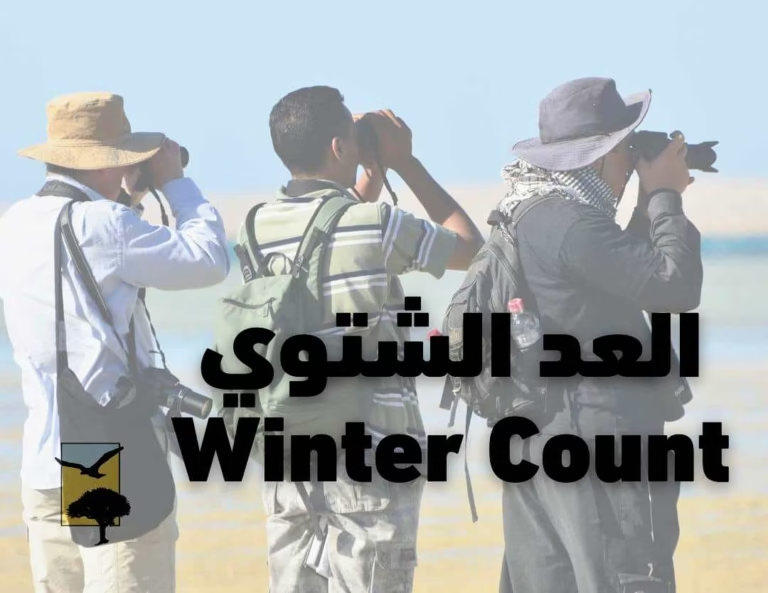
Mid‑Winter waterbird count
A highlight of the project was the Mid‑Winter Waterbird Count (January 2025), a 13‑day survey covering 104 transects of two kilometers each. To conduct the count, five local boats — once used primarily for hunting trips— were rented, creating immediate income for their owners and crews. These operators were introduced to birdwatching as an alternative tourism activity, showcasing a tangible shift from extractive practices to sustainable use of the lake’s natural heritage.
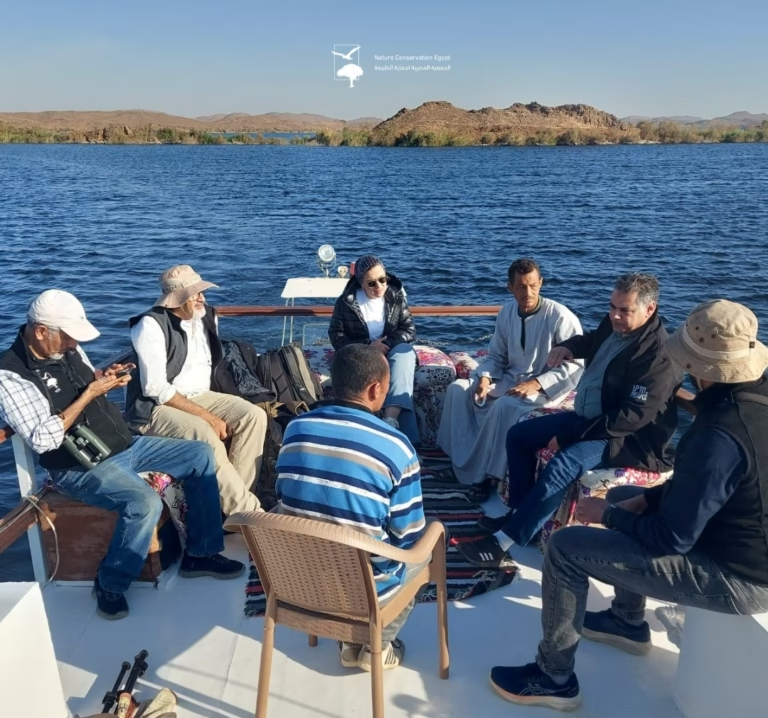
Advocacy and community engagement
Beyond training and surveys, Nature Conservation Egypt (NCE ), held awareness and advocacy forums with local communities. Meetings and field visits brought together senior representatives from the Ministry of Tourism, the Ministry of Environment, the Governorate of Aswan, and local park rangers. Discussions focused on explaining the rationale behind the hunting ban and demonstrating how bird tourism can benefit both biodiversity and local economies.
Celebrating birds and wetlands
To further embed conservation values in the community, the project supported the organization of World Wetland Day (February 2025) and World Migratory Bird Day (May 2025) in Aswan. These events, driven by volunteers, featured educational sessions, school outreach, and creative awareness activities that celebrated Lake Nasser’s importance as a haven for migratory birds.

Updating key Databases
The project’s scientific output also included updating Lake Nasser data on the International Waterbird Census (IWC) and the Waterbird Database (WBDB), ensuring that future conservation efforts are guided by accurate and up‑to‑date information.
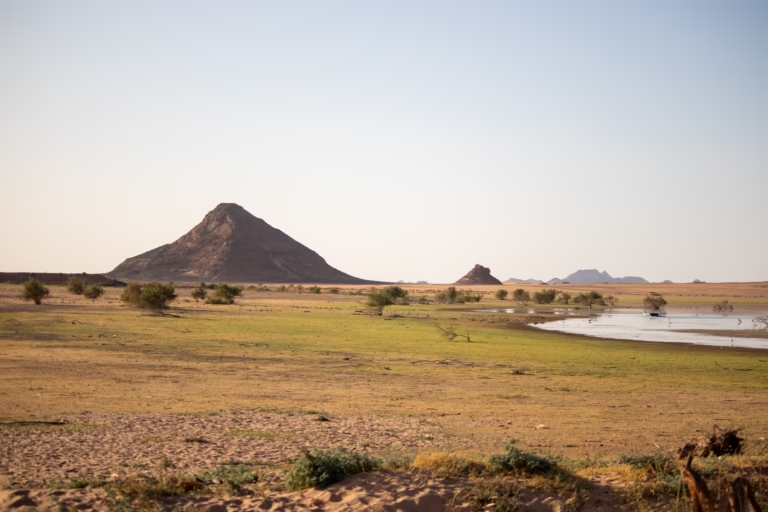
A Model for sustainable change
Through a combination of capacity building, scientific research, and advocacy, BirdLife International has demonstrated how local communities can transition from hunting‑based tourism to a thriving ecotourism model.
As one participant commented during the training: “For years our boats carried hunters; now we are learning to carry birdwatchers instead. It’s a new future for us and for the birds.”
This initiative stands as a milestone for Aswan, offering a blueprint for other regions seeking to align conservation with community livelihoods.
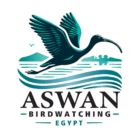
Pingback: Watching, Not Killing: How Bird Hunters Are Ruining Birdlife in Aswan
Pingback: Vogelbeobachtung in Assuan – Natur & Nil absolut erleben mit Aegyptika Reisen 2026